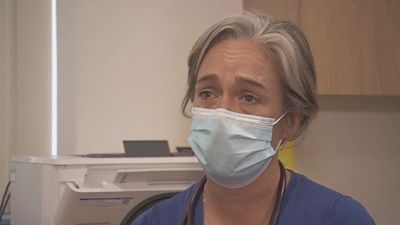Doctors facing 'relentless' abuse over Covid safety measures and huge demand

Doctors have told ITV Wales that they are facing "relentless" abuse over Covid safety measures and huge demand for GP services.
Patients at many surgeries across Wales are currently required to have a phone or video appointment before a physical one in a bid to prevent the spread of the virus.
But some GPs have said they are at the receiving end of frustrated patients who feel the measures are a barrier to getting seen.
Dr Helen Alefounder, who works in Colwyn Bay, said: "There are some days where it just feels relentless and it just feels like it's one patient, after the next, after the next, and you go home in the evening and feel sad.
"You really feel like you're not enjoying your job, you feel like you don't want to go back the next day.
While Dr Alefounder said "it's not every day", she added that "there is no need for the relentlessness of some of the abuse."
As well as reported abuse, doctors are facing a huge demand for medical advice.
It means other healthcare professionals are being brought in to help patients who do not need to see a GP.
Dave Leckie, a trainee advanced clinical practitioner, said: "We're all very experienced as either nurses or paramedics in our previous roles.
"I'd like to put people's minds at ease when they see us, and if we get stuck the GPs are only in the rooms next door and we'll always go and seek advice if we need to."
Some patients, including Mark Collins, have said they are content with the processes in place.
"I'm relatively happy with the way it goes now, and to be honest with you, the phone system is a fantastic system. It's great," he said.
"So I'm happy to keep that - I would eventually like to come in and see my doctor - but you know, for now."
In parts of Wales, the GP network is fragile. St Marks Dee View Surgery in Connah's Quay was recently forced to shut due to a shortage of doctors.
Betsi Cadwaladr University Health Board confirmed that it will not be closed permanently, and it is putting in additional resources.
Dr Chris Stockport, Director of Primary Care, said: "Here in north Wales, as well as most of the other areas in Wales, we are training more people in primary care than we ever have done.
"It takes a long time to train somebody to have those general skills in primary care, but that journey is underway.
"We're already starting to see many professionals coming through now with far advanced skills that have a huge role to play."
Analysis: Why are GP surgeries under so much pressure?
The experiences faced by GP surgery staff and patients at the moment I think boil down to two main issues.
One, the enormous changes brought about by the pandemic are still bedding in and as you might expect, there are teething problems.
Two, the fact that these changes are here to stay isn't understood or hasn't been accepted by patients.
These two factors are combining to create frustrated patients, who are taking their confusion and anger out on tired and pressured staff.
As is the case in many parts of Wales, when you need to book a doctor's appointment at the moment you'll most likely get a call back or video consultation, which may then lead to a face-to-face booking.
This doubling-up of clinicians workload may have been manageable during lockdowns when patients were staying away from surgeries, but as demand for medical advice is returning to pre-pandemic levels, this new workflow is demanding.
Remote appointments have been a necessary step in infection control, but it's worth remembering that doctors' surgeries were working on plans to introduce these types of appointments before the coronavirus outbreak, so the pandemic has essentially accelerated their introduction.
But the phrase 'because of Covid' has, I think, given the impression that these methods will soon disappear and that as the world opens back up life, including how we see our GP, will return to 'normal'. It won't.
Virtual calls with your doctor are here to stay, because, in lots of cases they remove the need for patients to be seen in person and can be convenient for both parties.
Like most workplaces, the GP surgery is almost unrecognisable to how it looked and functioned 18 months ago. They haven't gone anywhere but they are working differently and will continue to do so.
Staff are trying to navigate the transformation of their work at the same time as continuing to deliver high-quality care. There needs to be greater understanding and compassion as health professionals and patients adapt to the trail of irreversible change created by Covid.
Read more: